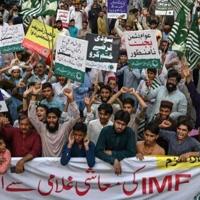The International Monetary Fund has agreed to loan Pakistan $7 billion to strengthen its struggling economy. Islamabad has pledged that this will be the last time it relies on assistance from the IMF.
This agreement marks Pakistan’s 24th payout from the IMF since 1958. In exchange for the loan, the South Asian nation has agreed to implement unpopular reforms, including expanding its low tax base.
Pakistan faced a near-default situation last year due to a shrinking economy, political turmoil following devastating floods in 2022, decades of mismanagement, and a global economic downturn. Emergency loans and an IMF rescue package saved the country, but its financial situation remains challenging with high inflation and significant public debts.
Prime Minister Shehbaz Sharif emphasized that this IMF program should be the last, urging for increased taxation on those currently exempt from taxes.
– Dealing with a downturn –
After months of negotiations, Islamabad reached an agreement with the IMF to secure the new $7 billion loan spread over three years, pending approval from the organization’s Executive Board.
The loan comes with conditions for comprehensive reforms, including increasing household bills to address energy sector weaknesses and boosting tax revenues.
In a country of over 240 million people where most jobs are informal, only 5.2 million individuals filed income tax returns in 2022. The government aims to raise $46 billion in taxes during the 2024-25 fiscal year, representing a 40% increase from the previous year.
To widen the tax base, the tax authority blocked 210,000 SIM cards of mobile users who have not filed returns. IMF Mission Chief Nathan Porter stated that the reforms aim to simplify and improve the tax system.
Pakistan also plans to reduce its fiscal deficit by 1.5% to 5.9% in the upcoming year, meeting another IMF requirement.
While the IMF believes the loan and reforms will stabilize Pakistan’s economy and promote growth, public debt remains a significant concern at $242 billion.
Analysts criticize the reforms as cosmetic changes to please the IMF without addressing fundamental issues within the country.
– Public backlash –
Prime Minister Sharif, who assumed power after controversial elections, introduced tough economic measures that may affect the government’s popularity. Protests have erupted over tax and bill increases outlined in the budget overseen by the IMF.
With a significant portion of the population already living in poverty, the World Bank warns that an additional 10 million Pakistanis may fall below the poverty line.
Pakistan’s previous IMF loan in 2023 came with austerity measures, including the removal of consumer subsidies.
els-jts/smw





